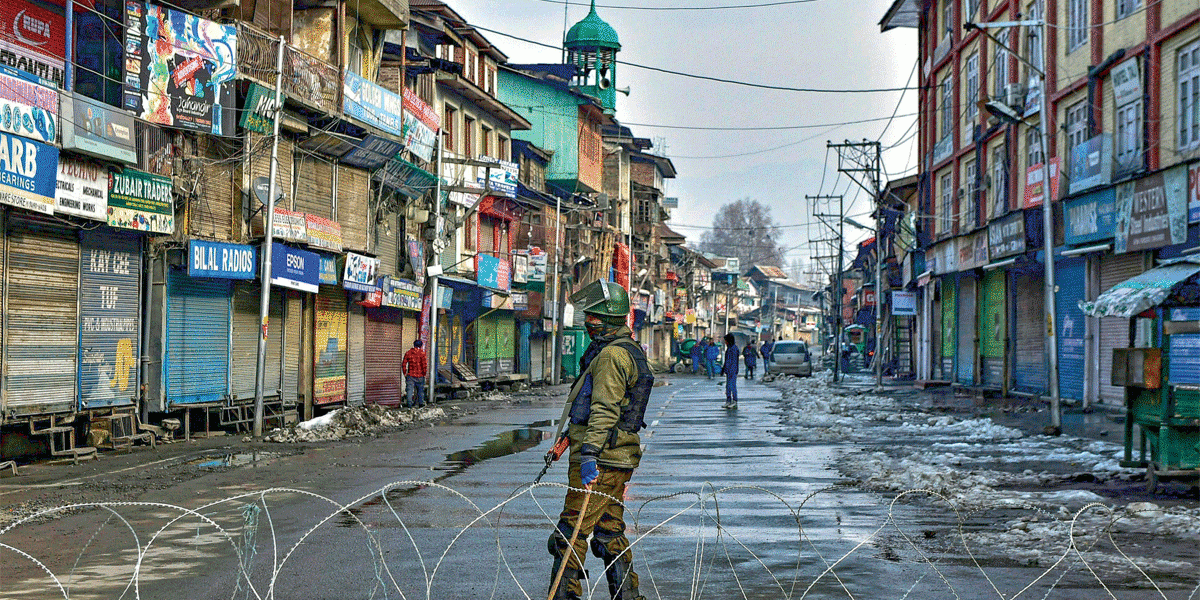February 5 was Kashmir Solidarity Day. This was an opportunity to be part of several webinars that exposed India’s settler-colonization and brutal military occupation that has effectively imprisoned 8 million people behind a communication siege and the veil of covid.
In December 2019, I was part of a small human rights delegation from North America that visited Azad Jammu and Kashmir. Now a year into a Covid-19 world, that visit in many ways seems a lifetime ago. But more importantly, for the people of Kashmir, events of past year are hard to fathom.
The people we met with in December 2019, 150 days into lockdown, were desperately holding onto slivers of hope. Not one of the people we talked to had been able to contact their family members in Indian-occupied Kashmir (IoK) since before the August 5 lockdown and the revocation of Article 370 and 35A. We were shocked when those in several camps we visited said this was the first visit from the international community in the 30 years since they were exiled from Iok. The message from the Kashmiris we met was clear: they wanted to return to their own land they had been exiled from within IoK, and they wanted freedom through the right to self-determination to be realized through the plebiscite promised them by the 1948 United Nations Security Council resolution.
Petitions in the Canadian Parliament
In November 2020, the Canadian government responded to three parliamentary petitions with regard to the situation in Indian occupied Kashmir. One was sponsored by Liberal MP Yasmin Ratansi, another by NDP MP Scott Duvall, and the third by Conservative MP Marilyn Gladu. These were signed by 3500 people across Canada. This was the first time that Indian occupied Kashmir had been mentioned in the Canadian parliament in regard to the military occupation and human rights violations since the early part of the century.
The government response to these petitions was less than adequate. It stated that Ottawa was monitoring the situation, that many restrictions had been lifted, but Canada “looks forward to restoration of normalcy and resumption of inclusive political dialogue in Jammu and Kashmir.”
This response missed the crucial point about the continued persecution of Kashmiri human rights defenders, civil society activists and journalists. It ignored that the Observatory for the Protection of Human Rights Defenders (FIDH & OMCT), Amnesty International, and the Rafto Foundation for Human Rights had issued statements requesting urgent intervention. It even overlooked the fact that Amnesty India had to shut its operations as it was being targeted for speaking out on rights abuses in India and in Kashmir.
The government made reference to Ottawa following “political developments, including the implementation of the Reorganization (Adaptation of State Laws) Order or domicile law issued by the Government of India on March 31, 2020.” But this is hardly adequate given that during this time, over 3.3 million domicile certificates have been issued by the occupying power—India—to its own settler population.
Occupation is a crime, from Kashmir to Palestine
The granting of these domicile certificates follows the May 18, 2020 Indian Government notification of the Jammu and Kashmir Grant of Domicile Certificate (Procedure) Rules. Since Jammu and Kashmir is an internationally disputed territory, this law, which entails forced transfer of populations and settlement, is in contravention of international law. This population transfer is prohibited by Article 49 of the Fourth Geneva Convention and condemned by the United Nations Sub-Commission on Prevention of Discrimination and Protection of Minorities. This population transfer is prohibited by Article 49 of the Fourth Geneva Convention. Under Article 1, Canada and other countries as a high signatory are accountable to ensure the Convention is upheld under all circumstances. Therefore, Canada and other high signatories are complicit if they do not take action.
With the introduction of the new Domicile policies, the indigenous population of the region is under threat, and one step closer to genocide. The introduction of new land laws, ending exclusive land rights of the indigenous people of Kashmir have paved the way for aggressive settler-colonization. This legal framework was put into action immediately by the Government of India and has shifted the demographics within a few months to one-quarter non-indigenous settlers. To put this in context, it has taken a half century of similar shift to demographics in the occupied West Bank of Palestine with less than one million settlers. In a matter of months, India’s colonization of Kashmir has made a similar demographic change.
The 21st century settler-colonization is in hyper drive for the people of Indian occupied Jammu and Kashmir. But despite thousands of letters sent to the Canadian government, including to opposition parties, since August 2019, there has been minimal response. The Trudeau Liberals’ useless response is that “Canada continues to encourage meaningful consultations with affected local communities and shares the aspiration that all communities in the region can live in peace, security and dignity.”
Solidarity
Civil society groups are calling on the Canadian government to condemn the government of India’s Domicile Law, and its illegal settlement-colonization. It is important to insist upon compliance with international legal obligations as part of Canada’s ongoing relationship with India. In 1948, Canada’s UN representative Andrew McNaughton had taken the lead in this resolution as president of the UN Security Council. Reminding Ambassador Bob Rae of this legacy, we must insist that Canada do proactive work with the UN towards implementation of self-determination for the people of Jammu and Kashmir.
With Marc Garneau’s recent appointment and mandate as Canada’s foreign minister, we are asking people across Canada to write him about Canada’s silence, and the urgent situation in Indian occupied Kashmir.
To learn more, watch the webinar Canada’s Silence on Indian occupied Kashmir. To take action, write to the Canadian government
Did you like this article? Help us produce more like it by donating $1, $2, or $5. Donate

